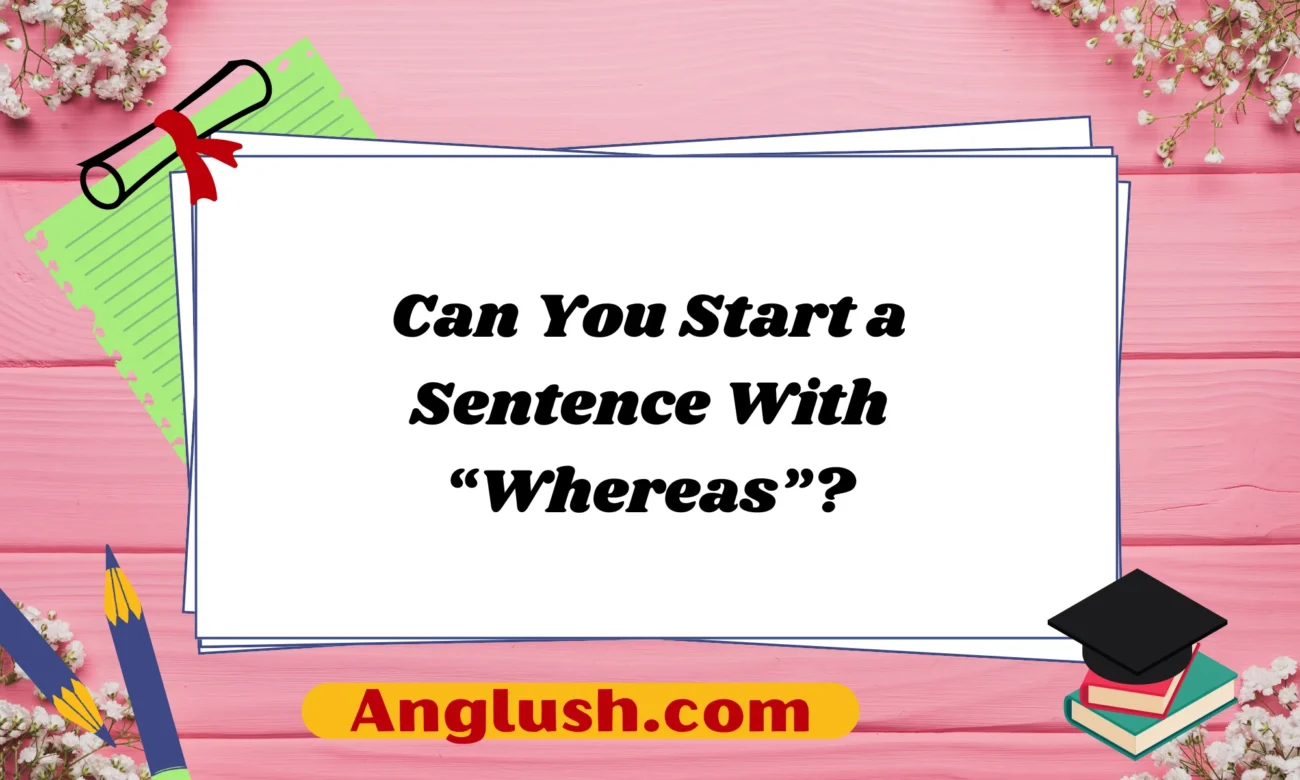Introduction
English grammar is full of nuanced rules and exceptions, and one common question is whether you can start a sentence with “whereas.” This word is often associated with formal writing, legal documents, and structured comparisons. However, its usage extends beyond legal contexts, and it can be effectively used in various types of writing.
This article will explore whether you can begin a sentence with “whereas,” alternative ways to express contrast, and examples of how to use it in different contexts. We’ll also discuss polite, professional, and casual substitutes, helping you enhance your communication skills.
Can You Start a Sentence With “Whereas”?
Yes, you can start a sentence with “whereas.” The word is a subordinating conjunction used to contrast two ideas. It is often employed in legal or formal writing but can also be used in everyday communication.
Examples of “Whereas” at the Start of a Sentence:
- Whereas John prefers coffee, Sarah enjoys tea.
- Whereas the first project was successful, the second one faced challenges.
- Whereas most students preferred online learning, some favored in-person classes.
In these examples, “whereas” introduces a contrast between two statements.
Understanding the Tone of “Whereas”
- Formal: “Whereas” is commonly found in contracts, policies, and academic writing.
- Neutral: It is suitable for professional emails and structured writing.
- Casual: Less frequently used in casual speech but acceptable in written comparisons.
Now, let’s explore alternative ways to convey contrast in a sentence.
Alternatives to Starting a Sentence With “Whereas”
If you want to avoid using “whereas,” here are some alternative phrases that express contrast effectively:
Formal Alternatives
- However,
- Example: However, John prefers coffee, while Sarah enjoys tea.
- On the other hand,
- Example: On the other hand, the second project faced challenges.
- In contrast,
- Example: In contrast, some students preferred in-person classes.
- While it is true that,
- Example: While it is true that most employees support the decision, a few disagree.
- Despite the fact that,
- Example: Despite the fact that the weather was bad, the event was a success.
Professional Alternatives
- Conversely,
- Example: Conversely, the new policy led to an increase in productivity.
- Yet,
- Example: Yet, some employees preferred the previous system.
- Although,
- Example: Although the budget was tight, the team delivered excellent results.
- Nevertheless,
- Example: Nevertheless, she managed to complete the project on time.
- That being said,
- Example: That being said, there are still concerns about implementation.
Casual Alternatives
- But,
- Example: But some people still prefer traditional methods.
- Still,
- Example: Still, it was an exciting experience.
- Even so,
- Example: Even so, we had a great time at the event.
Each of these alternatives can be used based on the formality and tone of your writing.
Choosing the Best Alternative Based on Context
When selecting an alternative to “whereas,” consider:
- Formality: Legal and academic writing often favors “whereas” or formal alternatives like “however” and “in contrast.”
- Clarity: Some phrases, like “but” or “still,” are more direct and easier to understand.
- Tone: A casual conversation may not require complex connectors like “conversely.”
Texting Examples of Alternatives to “Whereas”
Texting requires concise and clear communication. Here are 13 text-friendly examples:
- “You love coffee. But I prefer tea.”
- “He’s great at sports. On the other hand, I’m better at math.”
- “I know it’s late. Still, we should go out.”
- “The party was fun. Even so, I left early.”
- “She likes summer. I, on the other hand, love winter.”
- “I thought it would rain. Yet, it stayed sunny all day.”
- “It’s expensive. Nevertheless, it’s worth it.”
- “You don’t like movies? That being said, you might enjoy this one.”
- “They finished the project. However, they missed a few details.”
- “He’s serious about fitness. Conversely, I prefer to relax.”
- “I know we’re tired. Despite that, let’s keep going.”
- “We wanted to stay longer. Although, we had to leave early.”
- “The restaurant was crowded. Even so, we found a great spot.”
These examples are natural, easy to use, and suitable for quick conversations.
Conclusion
Starting a sentence with “whereas” is grammatically correct and often used in formal writing to introduce contrast. However, depending on the tone and context, alternatives like “however,” “on the other hand,” or “still” might be more suitable.

